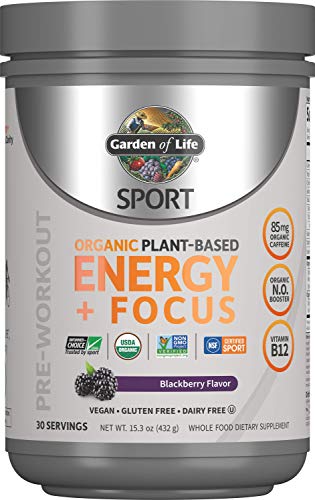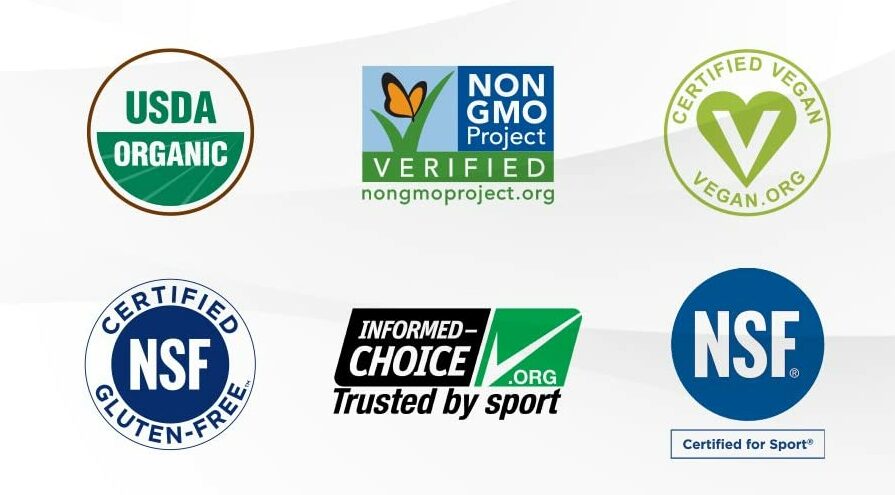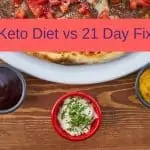For many fitness fanatics, consuming pre-workout supplements are something of a ritual. Such people view the consumption of pre-workouts before hitting the gym to be absolutely essential. To them, not consuming pre-workout will only lead to a low energy, low results workout.
At the same time, there is a significant segment of the fitness population that studiously avoids consuming pre-workout supplements. Many in this segment are firm followers of the whole ‘organic’ lifestyle, and the numerous artificial and chemical components in most pre-workout supplements are very off-putting to them.
This is where Garden of Life comes in. Garden of Life is a supplements company that focuses on serving the needs of this particular market. With the motto of “Empowering Extraordinary Health”, Garden of Life proudly boasts a range of supplements that are made from Certified USADA Organic Plants and Non-GMO Project Verified.
It also has a wide variety of products that are certified vegan and gluten-free.
In today’s article, we will be looking at Garden of Life’s pre-workout offering, known as Garden of Life Energy and Focus. The company touts this as an organic and plant-based product that will deliver ‘clean energy’ to fuel your workout. We will take an in-depth look at what goes into this product, how each ingredient can affect your workout, and whether it is worth its price. Let’s get right to it.
Topic Contents
Garden of Life Energy and Focus Review: Is This Organic Plant-Based Pre-Workout Worth It?
There are currently two versions of Garden of Life Energy and Focus on the market; the regular version and a sugar free version. In this review, we will be looking at both these products.
Basic Information
First, let’s take a high level look at what goes into these products.
| Regular | Sugar Free | |
| Serving Size | 14g (1 scoop) | 6g (1 scoop) |
| Servings per Container | 30 | 40 |
| Calories | 55 calories | 20 calories |
| Carbohydrates | 13g | 4g |
| Dietary Fiber | 2g | 2g |
| Sugars | 11g | 0g |
| Fat | 0g | 0g |
| Sodium | 20mg | 15mg |
| Cholesterol | 0mg | 0mg |
Astute readers will realize that the carbohydrate content cannot mathematically account for the number of calories per serving. With zero fat for each product, the net carbohydrates would only provide 44 calories for the regular version and 8 calories for the sugar-free version.
Hence, although not stated on the label for an unknown reason, each product looks like it has about 3g of protein per serving.
Sugar content is extremely high in the regular version, comprising 78.6% of the entire product! It’s no wonder then that the serving size of the sugar-free version is so much smaller. But what are the ingredients in the product that are providing this sugar, or the carbs for that matter? Let’s look at their ingredients list.
Ingredients List
Regular Version
| Ingredient | Amount per Serving |
| Vitamin B12 | 220mcg |
| Organic Antioxidant Energy Blend
Organic cane sugar, Organic baobab fruit, Organic amla berry fruit extract, Organic Coffeeberry whole coffee fruit extract |
12g |
| Organic Nitric Oxide Blend
Organic spinach leaf, Organic beetroot, Organic Kale leaf |
1g |
| Caffeine | 85mg |
Sugar-Free Version
| Ingredient | Amount per Serving |
| Vitamin B12 | 220mcg |
| Organic Antioxidant Energy Blend
Organic baobab fruit, Organic amla berry fruit extract, Organic Coffeeberry whole coffee fruit extract |
2g |
| Organic Nitric Oxide Blend
Organic spinach leaf, Organic beetroot, Organic Kale leaf |
1g |
| Organic stevia leaf extract | Not stated |
| Caffeine | 85mg |
If you read the label of Garden of Life Energy and Focus, you will note that they also list 40mg of Vitamin C and 10mcg of Vitamin K per serving. The reason we did not include them in the above tables is that these are naturally occurring as a result of the other ingredients. Not so for the Vitamin B12, this was added specifically to the products.
We should also note that the 85mg of caffeine is also naturally occurring, but we added it in because caffeine can be argued to be the primary ingredient in pre-workouts. This is also why many people simply drink black coffee as their pre-workout.
Looking at the ingredients list above, we can see that Garden of Life likes to group ingredients into ‘blends’ and then only state the amounts for those groups instead of individually. This is a very common practice in the supplements industry.
But it is one that we do not agree with as it reduces transparency and is often used to cover up just how much ‘cheaper ingredients’ the manufacturer is using.
We also want to highlight a possible discrepancy in the amount of the ‘Organic Antioxidant Energy Blend’. The regular version has 12g per serving while the sugar-free version has 2g per serving; a 10g difference.
This is because organic cane sugar is included in the regular version; 11g according to the label. Subtracting the sugar amount from the regular version and we are left with 1g of the blend, while the sugar-free version has 2g, which is double!
We have done a lot of research and we haven’t noticed anyone pointing out this discrepancy yet. We are going to assume that there was some calculation or rounding error and that both the regular and sugar-free versions have 2g of the ‘Organic Antioxidant Energy Blend’.
Now let’s take a look at the two blends and see how they can help your workout.
The Organic Antioxidant Energy Blend – What’s it for?
Let’s break down the three to four ingredients in this blend one by one and see the effect they have.
Organic Amla Berry Extract
Also known as Indian gooseberry, the amla berry is noted for its vitamin C content as well as its antioxidant benefits. It was widely used in ancient Ayurvedic medicine as well. Vitamin C is in itself an antioxidant, although the amla berry contains other antioxidants as well, namely ellagic acid, flavonoids, and tannin.
The amla berry’s status as a potent antioxidant has also been backed up by research.
The antioxidant properties of the amla berry appear to be the primary reason for its inclusion in this product. The amla berry is also noted for its benefits on hair health, cholesterol levels and cardiovascular disease risk, and anti-microbial properties.
Organic Baobab Fruit
Originating from one of the oldest trees in the world, the baobab fruit is known for its vitamin C content, which again is a natural antioxidant. It is also very high in fiber and is likely the primary fiber source of the products.
The fiber it provides is soluble fiber which also acts as a prebiotic. Just like the amla berry, the inclusion of the baobab fruit in this product seems to only be for its antioxidant content.
Organic Coffeeberry Whole Coffee Extract
There’s no surprise as to what this ingredient is for. It provides the 85mg of naturally occurring caffeine found in each serving of Garden of Life Energy and Focus. The word Coffeeberry is a registered trademark of FutureCeuticals Inc., which is a leading manufacturer of fruit, vegetable, and grain-based products for the functional food, cosmetics, and dietary supplement markets.
Basically, they are one step up the supply chain for many supplement companies. Look through their website and you will see many familiar trademarked ingredients that are used in various products from different supplement companies.
The berry in Coffeeberry refers to the premium coffee fruit from which the beans are traditionally extracted. FutureCeuticals notes that the fruits are hand-picked and undergo proprietary eco-friendly processing, which supposedly preserve nutrients compared to the traditional sun-drying method.
Unlike traditional methods, the entire coffee fruit is used in producing this ingredient instead of just the bean.
Organic Cane Sugar
Found only in the regular version (obviously), organic cane sugar is often used in such ‘organic supplements’ as a supposedly healthier version of table sugar. Fact; organic cane sugar is still sugar, and your body processes it as such.
Since it is organic however, the sugar cane from which it is produced from will not have used pesticides and thus may have some long term health benefits (or rather lack of long term health risks).
Regardless of the above, 11g per serving of sugar is an extremely high amount. It could be argued that the high sugar content is ‘less bad’ in a pre-workout because you will presumably burn it all up during your workout. On the positive side, this could be a good source of short term energy for your workout. On the other hand, you could get the same effect from just eating a banana.
Conclusion
At 85mg of caffeine per serving, this is actually on the very low end compared to other stimulant pre-workout supplements. Most of the leading pre-workout brands on the market today have about 150mg to 200mg of caffeine per serving, with some even going as high as 300mg or more!
So if you’re looking for a pre-workout that can give you that huge ‘caffeine kick’, then you will probably find this product quite unsatisfactory. You might also feel the effects of the high sugar in the regular version just as much as the caffeine.
You might be wondering why antioxidants, beneficial as they are, would be included in a pre-workout. You might be surprised to know that antioxidants can, in fact, have beneficial effects on exercise performance. During exercise, oxygen consumption is increased which results in higher amounts of oxidative stress, free radicals, and lipid peroxidation. Antioxidants help combat this.
Another possible explanation is that antioxidants may possibly prevent the destruction of the red blood cell membrane during exercise.
Some studies have shown that acute antioxidant consumption before or during exercise can lead to improvements in both endurance and resistance training exercises. Yet other studies have shown no improvement in exercise performance although noting that people with a high level of physical activity should consume more antioxidants.
Hence, the verdict is still out on whether antioxidants can help your workout or not. To be sure, they certainly can’t hurt. Nevertheless, we do note that the antioxidants in this blend come mainly from Vitamin C, the synthetic version of which (ascorbic acid) is as we all know plentiful and cheap.
The Organic Nitric Oxide Blend – What does it do?
Now let’s look at the second blend of the products. First, we should explain what exactly nitric oxide is and how it can affect exercise performance.
What is Nitric Oxide?
Nitric oxide is a molecule formed from nitrogen and oxygen. In our body, it acts as a signaling molecule, meaning that it helps the cells in our body communicate with each other. It is naturally produced in our body through the breakdown of the amino acid arginine.
It plays an important role in vascular relaxation (which affects blood pressure), inflammation, immune response and even memory formation.
In the fitness world, nitric oxide supplements are taken because of their vascular relaxing properties. The relaxation of the blood vessel walls in the body results in increased blood flow.
This increased blood flow moderates increased blood pressure and appear to improve exercise performance by reducing the ‘oxygen cost’. This may result in a higher time to exhaustion, and nitrate supplementation may be useful for both anaerobic and aerobic (endurance) workouts.
Organic Spinach Leaf
We all know that spinach is good for us. Popeye told us as much. But their micronutrients are not the reason that spinach was included in this product.
Not many people know that spinach is also a great source of dietary nitrate. One study showed that a spinach-rich diet had positive effects on arterial stiffness.
Organic Kale Leaf
Kale is the vegetable ‘superfood’ that has somehow become unavoidably associated with the ‘snobby healthy conscious crowd’. To be sure, it has a great nutritional profile (some people think of it as a better version of spinach) but just like spinach, its inclusion in this product is solely for its nitrates.
Organic Beetroot
Beetroot is another great source of nitrates. In fact, it’s probably the most potent source of nitrates in this list. In the studies linked to the ‘nitric oxide’ section above on how nitric oxide supplements can improve exercise performance, ALL of them used beetroot juice as the primary source of nitrates for the test subjects.
Conclusion
We like Garden of Life’s organic nitrate blend in its Energy and Focus pre-workout. At about a gram per serving, this is in line with the amount of nitric oxide typically found in pre-workouts. While spinach and kale have their nutritional benefits as well, at the quantities present in the product, they are negligible and entirely incidental.
Vitamin B12 – Why Did They Include This?
Each serving of Garden of Life Energy and Focus also includes 220mcg of Vitamin B12. The reason Vitamin B12 was specifically included in the ingredients is that it is an essential ingredient in red blood cell production.
The working theory is that Vitamin B12 supplementation will help increase this. This theory is so popular that many athletes actually inject themselves with vitamin B12 prior to a game.
So it seems to be really effective, but unfortunately, the research shows otherwise. Unless there is a vitamin deficiency, additional vitamin B12 supplementation appears to have no additional effect on exercise performance, with the placebo group performing just as well as the group given Vitamin B12 injections.
Hence, while we applaud the addition of Vitamin B12 in the product, and it certainly can’t hurt, you shouldn’t expect any performance benefit in your workout from this ingredient.
Flavor
Now we move on to what may seem trivial but is actually a major factor that determines whether or not a person sticks to a particular product – taste. Garden of Life Energy and Focus only comes in one flavor – Blackberry for the regular version and Blackberry Cherry for the sugar-free version. So if you don’t like the one flavor they have to offer, you’re out of luck.
In terms of taste, most users seem quite split. While a majority of users found the taste good or at least acceptable, a significant minority (much higher compared to most other products out there) found the taste to be absolutely unpalatable.
This is always the drawback when it comes to ‘natural’ products, due to the lack of artificial flavoring. Since taste is subjective, we cannot give a definitive judgment on the taste, but be aware that it probably won’t be the product’s strong suit.
Value for Money
Garden of Life does not actually sell any products directly from its official website. So the closest approximation we have is on Amazon. Using prices from Amazon, a single serving of Garden of Life Energy and Focus would cost you $0.93 for the regular version and $0.70 for the sugar-free version.
This is actually decent value for money and places it about on par or even better than most of the pre-workout supplements on the market. The regular version can be considered to be about average in terms of price, but the sugar-free version is definitely good value for money.
Certifications
Garden of Life Energy and Focus has the following certifications:
- USDA Organic Certified
- Non-GMO Project Verified
- NSF Certified for Sport
- NSF Certified Gluten-Free
- Informed Choice for Sport Certified
Final Verdict
Garden of Life Energy and Focus is a decently priced and high quality organic pre-workout supplement. We like that the company has gone through the trouble of actually getting proper organic certifications instead of just claiming that it is organic, as many supplement companies are unfortunately wont to do. Further, despite being fully organic, they don’t use that as an excuse to charge a premium price.
That being said, many of its ingredients, in particular, antioxidants and vitamin B12 have questionable efficacy in improving exercise performance. The amount of caffeine is also on the low end; a common complaint in the negative reviews of this product. Our recommendation is that those who are looking for an organic pre-workout to try this product at least once.
Quick Review Table
| Pros | Cons |
| Good value for money | High sugar content |
| Certified fully organic | Questionable efficacy of some ingredients |
Recommended Reads:
Alt Protein Team is a team of professionals and enthusiasts committed to bringing you the most up-to-date information on alternative protein, health and wellness, workouts, and all things health-related. We’ve reviewed a lot of products and services so you don’t have to guess when you spend your hard-earned money on them. Whether you want to shed some pounds, build lean muscle or bulk, we can help you figure out what you need to do and what you need to have to achieve your goals.









